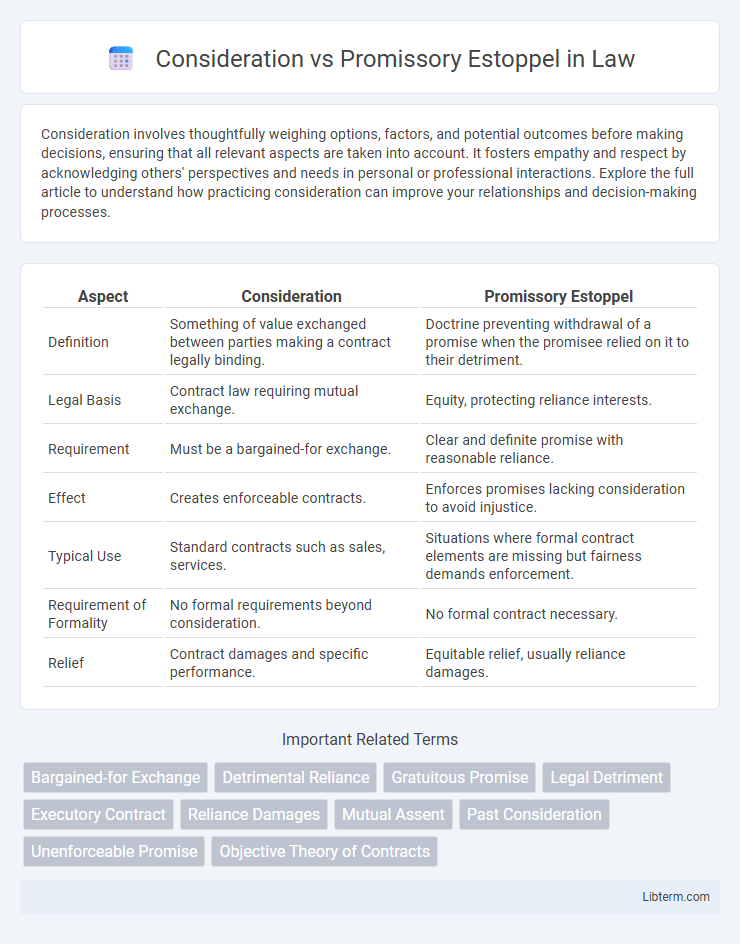Consideration involves thoughtfully weighing options, factors, and potential outcomes before making decisions, ensuring that all relevant aspects are taken into account. It fosters empathy and respect by acknowledging others' perspectives and needs in personal or professional interactions. Explore the full article to understand how practicing consideration can improve your relationships and decision-making processes.
Table of Comparison
| Aspect | Consideration | Promissory Estoppel |
|---|---|---|
| Definition | Something of value exchanged between parties making a contract legally binding. | Doctrine preventing withdrawal of a promise when the promisee relied on it to their detriment. |
| Legal Basis | Contract law requiring mutual exchange. | Equity, protecting reliance interests. |
| Requirement | Must be a bargained-for exchange. | Clear and definite promise with reasonable reliance. |
| Effect | Creates enforceable contracts. | Enforces promises lacking consideration to avoid injustice. |
| Typical Use | Standard contracts such as sales, services. | Situations where formal contract elements are missing but fairness demands enforcement. |
| Requirement of Formality | No formal requirements beyond consideration. | No formal contract necessary. |
| Relief | Contract damages and specific performance. | Equitable relief, usually reliance damages. |
Understanding Consideration in Contract Law
Consideration in contract law refers to the bargained-for exchange between parties, where each party provides something of value, such as money, goods, services, or a promise, forming the foundation for a legally enforceable agreement. Understanding consideration is essential because it distinguishes enforceable contracts from mere promises, requiring that the exchange be mutual and legally sufficient. Unlike promissory estoppel, which enforces promises without consideration under certain conditions to prevent injustice, consideration doctrine demands a reciprocal inducement to validate contract obligations.
Defining Promissory Estoppel
Promissory estoppel is a legal principle that enforces a promise when one party reasonably relies on it to their detriment despite the absence of formal consideration. This doctrine prevents the promisor from reneging on their promise if injustice can only be avoided by enforcement. Unlike consideration, which requires a bargained-for exchange, promissory estoppel relies on reliance and fairness to uphold contractual obligations.
Key Elements of Consideration
Consideration requires a bargained-for exchange where both parties mutually agree to provide something of value, such as a promise, act, or forbearance. It must be legally sufficient, meaning the consideration has some measurable value and is not illusory or past performance. Promissory estoppel, in contrast, enforces a promise without consideration when one party reasonably relies on it to their detriment.
Core Principles of Promissory Estoppel
Promissory estoppel prevents a party from retracting a promise when the promisee has reasonably relied on it to their detriment, even in the absence of formal consideration. Core principles include a clear and definite promise, reasonable and foreseeable reliance by the promisee, and resulting hardship or injustice if the promise is not enforced. This doctrine serves to uphold fairness and prevent injustice when traditional contract elements like consideration are missing.
Key Differences: Consideration vs Promissory Estoppel
Consideration involves a bargained-for exchange where both parties provide something of value, forming the basis of a binding contract under common law. Promissory estoppel, by contrast, enforces a promise when one party reasonably relies on it to their detriment, even without formal consideration, preventing injustice. The key difference lies in consideration requiring mutual exchange, while promissory estoppel enforces reliance-based promises absent of such exchange.
When Is Consideration Essential?
Consideration is essential in contract law when validating a bilateral agreement where both parties exchange something of value, establishing mutual obligation. Promissory estoppel applies when one party relies on a promise to their detriment despite the absence of formal consideration, preventing the promisor from reneging. Courts require consideration to enforce typical contracts, but promissory estoppel serves as an equitable remedy when strict adherence to consideration would result in injustice.
Situations Where Promissory Estoppel Applies
Promissory estoppel applies in situations where a promise induces reasonable reliance by the promisee, and enforcing the promise is necessary to avoid injustice, even without formal consideration. Common scenarios include promises to donate, assurances of employment, or modifications of contract terms where the promisee has acted to their detriment based on the promisor's assurance. This equitable doctrine prevents a promisor from reneging on a commitment when the promisee's reliance is foreseeable and significant.
Legal Case Examples for Both Doctrines
Consideration requires a bargained-for exchange as seen in *Hamer v. Sidway* (1891), where the court upheld a promise supported by forbearance. Promissory estoppel applies when a promise induces reasonable reliance, demonstrated in *Central London Property Trust Ltd v. High Trees House Ltd* (1947), where a rent reduction promise was enforced despite lack of consideration. Both doctrines protect contractual expectations but differ on the necessity of exchanged value versus reliance.
Impact on Contract Enforceability
Consideration requires a bargained-for exchange essential to contract enforceability, ensuring mutual obligations are recognized by the courts. Promissory estoppel enforces promises lacking consideration when one party reasonably relies on the promise to their detriment, preventing injustice. The impact on contract enforceability is significant: consideration validates traditional contracts, while promissory estoppel saves promises where strict adherence to consideration would result in inequity.
Choosing Between Consideration and Promissory Estoppel in Practice
Choosing between consideration and promissory estoppel hinges on the contract's enforceability factors; consideration requires a bargained-for exchange while promissory estoppel enforces promises lacking traditional consideration to prevent injustice. Courts favor promissory estoppel when a promisee reasonably relies on a promise to their detriment, and enforcing it avoids inequity despite absent consideration. Legal practitioners assess the presence of reliance, the foreseeability of harm, and the intent of parties to determine whether to pursue consideration-based or promissory estoppel claims.
Consideration Infographic

 libterm.com
libterm.com